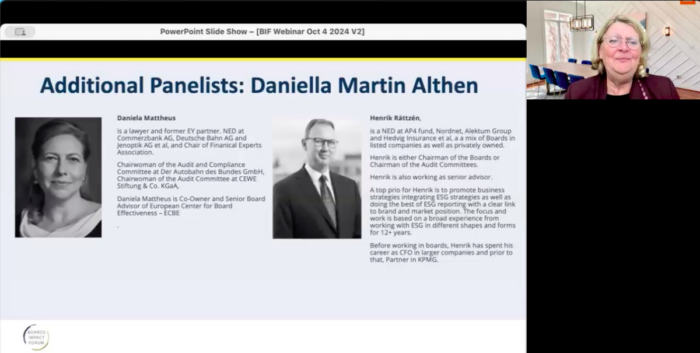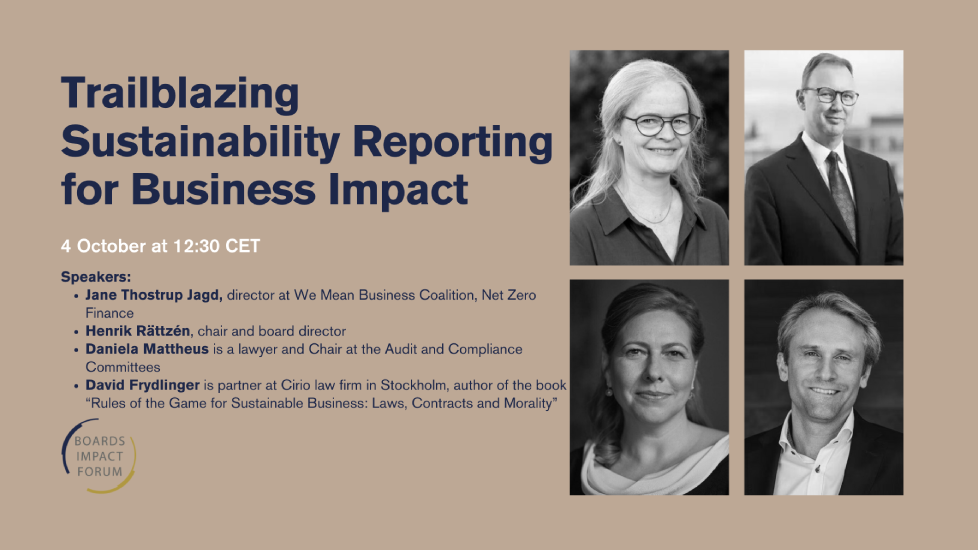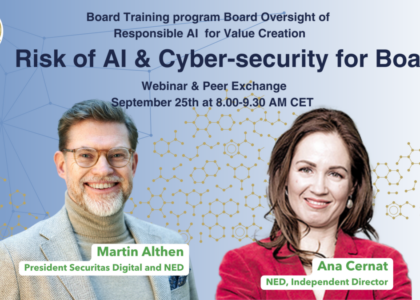On October 4th, 2024, Boards Impact Forum hosted a webinar on “Trailblazing Sustainability Reporting for Boards.” Facilitated by Liselotte Engstam, Chair of Boards Impact Forum, the webinar provided insights from leading experts in the field, and offered practical examples of how companies are successfully integrating ESG reporting to drive business transformation and manage risk.
Speakers and Panelists:
- Jane Thostrup Jagd, Director at We Mean Business Coalition, Net Zero Finance, and member of multiple technical working groups.
- Henrik Rättzén, experienced board member and audit committee chair, with over 12 years of ESG experience.
- Daniela Mattheus, lawyer and management consultant, co-owner of the European Center for Board Effectiveness.
- David Frydlinger, partner at Cirio law firm and author of “Rules of the Game for Sustainable Business”.
- Facilitation by Liselotte Engstam, Chair Boards Impact Forum and chair and NED at listed and private companies.
Table of Contents
Key Takeaways and Regulatory Landscape
The webinar highlighted several crucial points for board directors, emphasizing the increasing complexity and regulatory nature of sustainability reporting. With over 20 jurisdictions either adopting or planning to adopt ISSB standards, the global push towards standardized sustainability reporting is evident. Dr. Jane Tostryak provided an in-depth discussion on the EU’s Corporate Sustainability Reporting Directive (CSRD) and emphasized the growing importance of taxonomy reporting for investors, referencing the We Mean Business Coalition’s report on Early Adopters of CSRD Reporting. She noted that companies now need to navigate through 1,388 potential data points in the new standards, underscoring the complexity of the task at hand. Tostryak cautioned, “Starting with reporting alone will lead to drowning in details. Boards need to guide the process by focusing on what’s strategically important,” highlighting the need for a strategic approach to sustainability reporting.
Double Materiality Assessment (DMA) and TCFD Reporting
The Double Materiality Assessment (DMA) emerged as a central theme, highlighted as a crucial tool for focusing on important sustainability topics and integrating them into overall business strategy. This approach considers both the impact of sustainability issues on the company and the company’s impact on society and the environment. David Fridinger emphasized its strategic importance, noting, “The DMA is not just a reporting exercise. It’s a tool for boards to have strategic discussions with management about sustainability priorities.”
The panel also delved into the importance of Task Force on Climate-related Financial Disclosures (TCFD) reporting. They stressed the growing need for companies to not only identify but also quantify and monetize climate-related risks and opportunities. This approach provides a more tangible understanding of sustainability’s financial implications. Henrik from AP4 fund shared an investor’s perspective, stating, “It’s not enough to just have policies; we need to see the financial implications.” This insight underscores the increasing demand for concrete, financially-relevant sustainability data from the investment community.

Framework for Sustainable Business and Challenges
David Fridinger presented a comprehensive framework for sustainable business, emphasizing the importance of starting with a company’s core purpose and values. He advocated for a holistic approach that focuses on positive contributions to society and the environment while avoiding significant harm. Fridinger stressed the need for clear organizational structures and governance for sustainability, as well as the integration of sustainability principles into day-to-day business operations. This approach aims to embed sustainability deeply into the business model rather than treating it as an add-on reporting exercise.
The panel discussion also brought to light several key challenges facing boards in this arena. These included the delicate balance between meeting extensive reporting requirements and maintaining a strategic focus on sustainability, ensuring the quality and reliability of sustainability data, and the ongoing need for board education on rapidly evolving sustainability matters. Daniela Mattios, drawing from her audit committee experience, shared a pertinent concern: “We need robust internal control systems to ensure we’re reporting accurate information.” This highlights the growing need for rigorous data management and verification processes in sustainability reporting.
Next Steps for Boards and Conclusion
The webinar concluded with actionable steps for board directors, including starting with purpose and strategy, ensuring integration of sustainability into overall business strategy, focusing on material issues, improving quantification of climate-related risks and opportunities, and continuously educating board members on evolving sustainability standards.
The webinar emphasized the critical role of board leadership in driving sustainable business practices. By understanding the regulatory landscape, focusing on material issues, and integrating sustainability into core business strategies, boards can effectively guide their companies towards a more sustainable future while meeting evolving reporting requirements.
About Boards Impact Forum and the blogpost
Events arranged by Boards Impact Forum in collaboration with World Economic Forum (Non Profit Board Network, partnering with Board Networks , INSEAD Corporate Governance Centre, Digoshen and Next Agents )
This blogpost is also shared at the blog of of Digoshen, www.digoshen.com.








Recent Comments